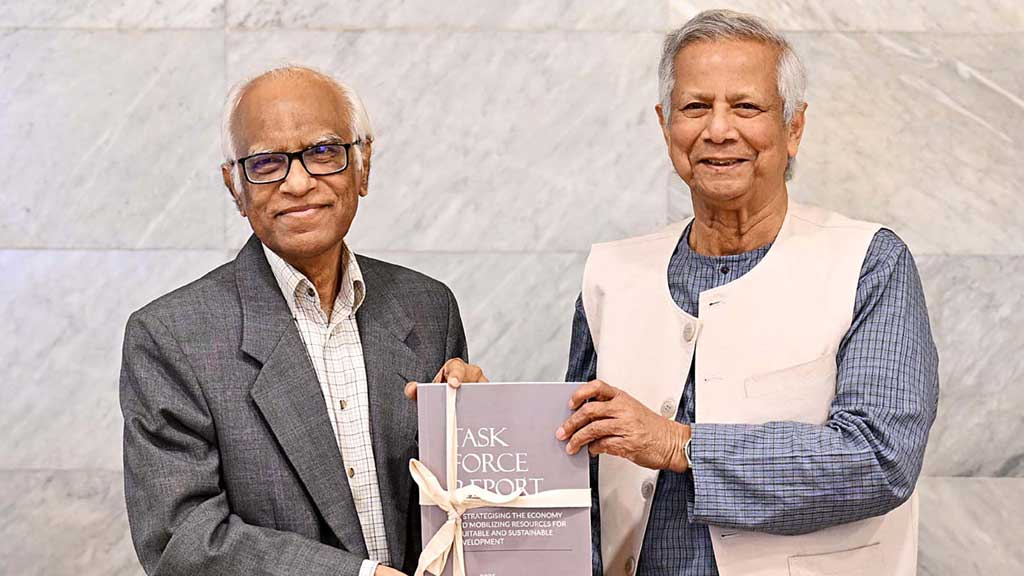Staff Correspondent
Published:2025-01-31 13:08:07 BdST
Report of taskforce on re-strategising economyCreating Centre of Global Excellence urgent
Education and Planning Advisor Wahiduddin Mahmud handed over the report to Chief Advisor Muhammad Yunus on Thursday
The taskforce on re-strategising the economy and mobilising resources for equitable and sustainable development has put forward a set of proposals in its report submitted on Thursday.
Their proposals covering areas such as institutional reforms, urban transport initiatives, the manufacturing sector, exports, foreign direct investments (FDIs), pilot projects, and cross-cutting actions.
The report outlines a strategic framework to guide the interim government in tackling urgent economic challenges while promoting economic growth, social development, and environmental sustainability.
A summary of the report has been handed to Chief Advisor Muhammad Yunus.
According to a press release from the Chief Advisor’s Office, Education and Planning Advisor Wahiduddin Mahmud submitted the report on Thursday.
Former director general of the Bangladesh Institute of Development Studies (BIDS) Dr KAS Murshid heads the 12-member task force, which was formed by the interim government in September last year following the August 5 political changeover.
Its mandate is to develop strategic policies aimed at achieving anti-discriminatory and sustainable development.
The Planning Commission’s Member (General Economics Division) Md Kausar Ahmed serves as Member Secretary.
Other members include former World Bank official Syed Akhtar Mahmood, Professor Selim Raihan of the Economics Department at Dhaka University, Abdur Razzaq, former head of research at the Commonwealth Secretariat, Professor Mushfiq Mobarak of economics at Yale University, Professor Shamsul Haque of BUET, Professor Rumana Huque of economics at Dhaka University, former president of the Metropolitan Chamber of Commerce and Industry Nasim Manzur, BIDS Research Director Dr Monzur Hossain, CPD Executive Director Fahmida Khatun and CEO of BDJobs.com A K M Fahim Mashroor.
The task force has proposed pilot projects to develop scalable models for broader reforms in the future. These include public hospital reforms, rural school and clinic reforms, and reforms of Bangladesh Road Transport Authority (BRTA).
It strongly recommends that an entire ministry be selected for a pilot initiative to establish a real-time monitoring and evaluation system.
This system would generate critical key performance indicators, allowing the top leadership to review project and programme performance efficiently across departments, directorates, and divisions.
The report also stresses the need to establish new institutions. One of its key proposals is the creation of Centre of Global Excellence, which it describes as an urgent necessity.
Regarding Biman Bangladesh Airlines, the report calls for a reassessment to make the national flag carrier a competitive player in the global aviation industry.
It emphasises the importance of setting clear and measurable performance targets.
The task force recommends the immediate formation of a National Board of Revenue (NBR) oversight committee with proportional representations from the private sector, the civil society, and the government.
The report highlights automatic traffic signalling as a fundamental requirement for major cities. However, it notes that past efforts to implement such systems in Dhaka have failed due to resistance from groups with vested interests.
The task force emphasises the need to enhance the One-Stop Service (OSS) system, which is designed to expedite investment proposal approvals.
While OSS remains an essential component for improving Bangladesh's investment climate, its efficiency requires significant improvement.
The report highlights a growing global demand for skilled labour. Countries such as Japan and South Korea are exploring opportunities to import skilled workers due to their declining and ageing populations.
Bangladesh is seen as a potential labour source for these economies in sectors such as industry, healthcare and services.
While Special Economic Zones (SEZs) have received considerable political and media attention, the report points out that actual progress on their establishment and full operationalisation has been minimal. Revitalising SEZs is critical for economic development.
A major strategic focus should be placed on leveraging digital and artificial intelligence (AI) technologies across key sectors such as education, healthcare, agriculture, and public institutions.
The report urges a comprehensive approach to accelerate the adoption of digital and AI-driven solutions to enhance governance, service delivery, and economic competitiveness.
The taskforce asserts that these proposals call for shared responsibility between policymakers and the public to build a better future.
With strong leadership and strategic planning, Bangladesh can turn challenges into opportunities, ensuring a prosperous, equitable, and stable nation for current and future generations.
Unauthorized use or reproduction of The Finance Today content for commercial purposes is strictly prohibited.


